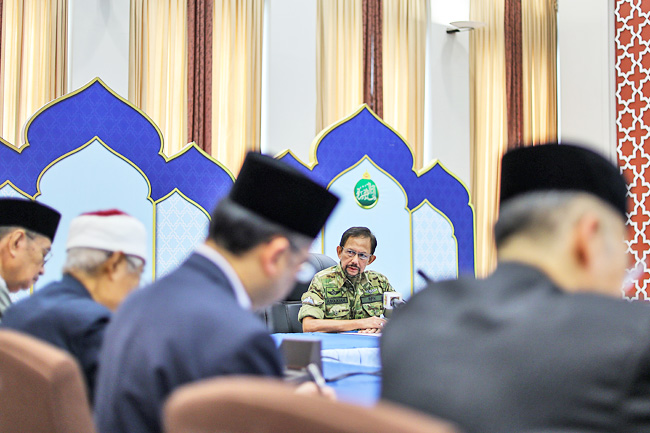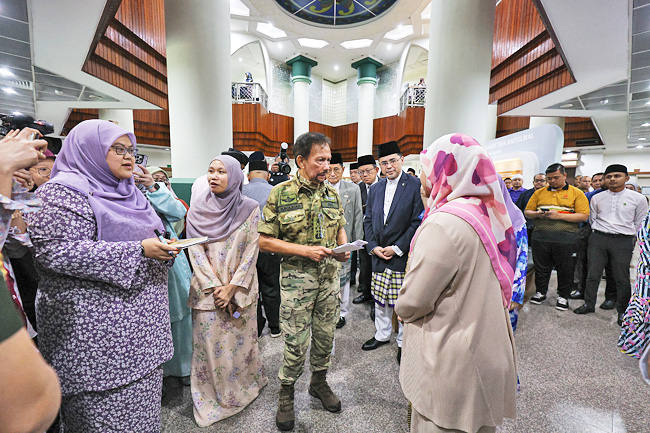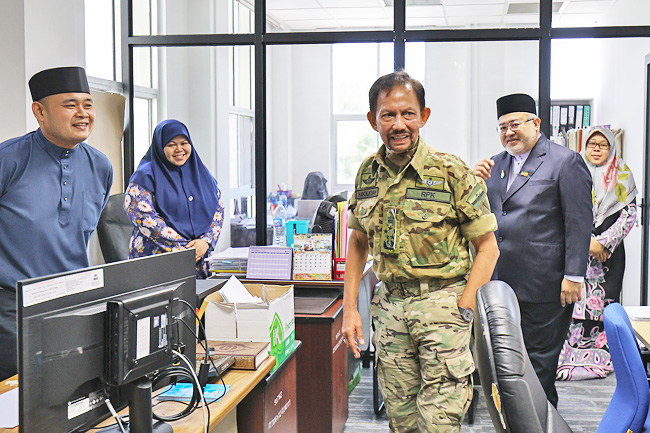His Majesty Sultan Haji Hassanal Bolkiah Mu’izzaddin Waddaulah ibni Al-Marhum Sultan Haji Omar ‘Ali Saifuddien Sa’adul Khairi Waddien, Sultan and Yang Di-Pertuan of Brunei Darussalam underscored the importance of strengthening the psychology of teaching among religious school teachers and reviewing the curriculum taught at religious schools.
His Majesty made the call in a titah during an unscheduled visit to the Ministry of Religious Affairs yesterday.
The monarch also emphasised that it is mandatory for students to receive religious education from Primary 1 to 6, stressing that the delivery of this education should encompass various educational methods, teaching approaches, and subjects crucial for students of all ages.
Teaching religious subjects, especially to younger students, requires a deep understanding of psychology to ensure effective learning.
The monarch inquired whether teachers in religious schools are equipped with the necessary psychological skills for teaching and noted that religious subjects can be challenging and that the ratio between teachers and students requires a balanced approach, neither overly strict nor too lenient.
“Some parents are grumbling in that their children are unhappy at religious schools as some teachers are too strict and force the students to study. If it is true, the teachers neglect the psychology factor,” His Majesty said.



His Majesty expressed concerns about the subjects taught at religious schools and suggested changes and recommended renaming the Tarikh subject to Tarikh Islam and making it a compulsory subject.
Additionally, the monarch called for a review of the Tasawuf subject, as it was found to be difficult for children aged 10 to 13. His Majesty proposed renaming this subject to Akhlak, which the monarch believed would be more comprehensible to students. His Majesty also questioned certain terminology used in books for Primary 4, 5, and 6, such as Maksiat Batin and Taat Batin, suggesting that these terms are more relevant to practitioners of Tasawuf or Tarikat and may not be suitable for schoolchildren.
Regarding the subject of Faraidh (distribution of wealth to heirs) taught in Primary 6 classes, His Majesty expressed concerns that it is too challenging for children and may lead to conflicts and disinterest in learning.
“And if we force them to learn, conflicts would arise such as children disliking the subject or will not like the teacher and even worst, do not want to go to school solely to avoid this subject. This is not an assumption but a reality whereby many parents have expressed their grievances. Hence it is appropriate for the ministry to study this matter,” the monarch said.
His Majesty also raised questions about the scholarship policy for students going overseas for religious studies while inquiring about the criteria for awarding scholarships and expressed the need for a more comprehensive policy to ensure the future of religious education.
“I raised this matter as there are issues arising whereby although there are many students who are eligible to go to Egypt to further their studies, only three obtained scholarships while another 60 are doing it privately or through the Education Loan Assistance Scheme.
“I wish to know why only three students are chosen to get the scholarship and what are the criteria used? Are students with Mumtaz (excellent) grade only allowed to get the scholarship while students scoring Jayyid Jiddan (very good) are not given the opportunity?
“In my opinion, this matter should be reviewed. In addition, out of the three students going to Al-Azhar University in Egypt, only two are heading to Al-Azhar University while the other is studying at another university to undergo Fiqh and Usul.
“Why is the student studying at a different place although it is recognised but only suitable for other advanced course but not for freshers as they have not gained experience and strong foundation to defend themselves if there are other teaching?
“We fear that the new students are influenced by teachings other than Ahli Sunnah Wal Jama’ah.
“It seems that the Ministry of Religious Affairs and probably the Ministry of Education are yet to possess a firm policy which I described as ‘to rescue human capital policy’.
“When there is no policy in place, these ministries are seen practising an open attitude with no hindrance for students to choose their own university unlike if we have the policy,” the monarch said.
During the visit, His Majesty was accompanied by Cabinet ministers, including the Minister of Religious Affairs, Minister at the Prime Minister’s Office and Minister of Defence II, Minister at the Prime Minister’s Office and Minister of Finance and Economy II, and the Minister of Education. His Majesty also toured various departments at the ministry, including the Department of Zakat, Waqaf and Baitulmal Management. – Azlan Othman


